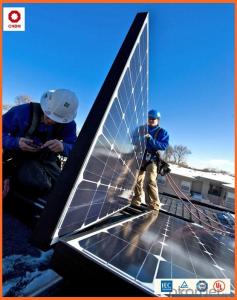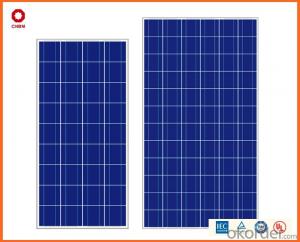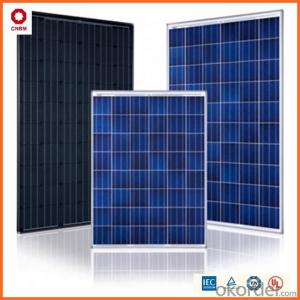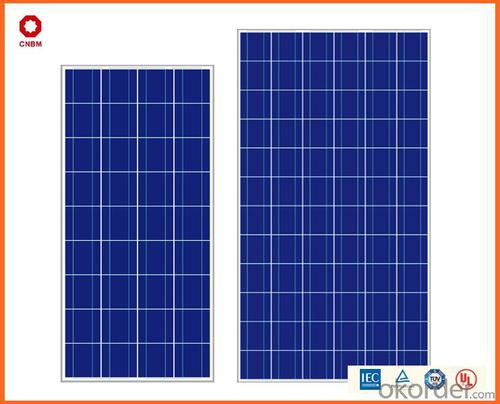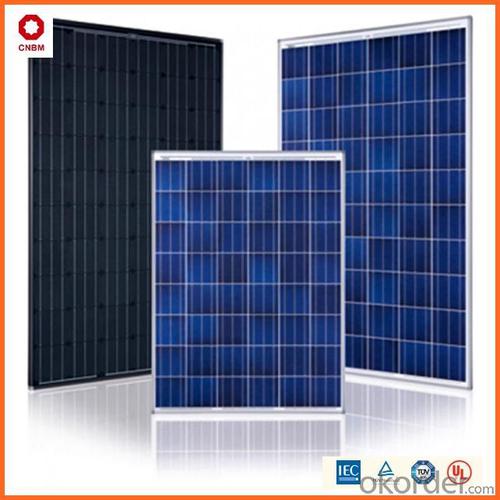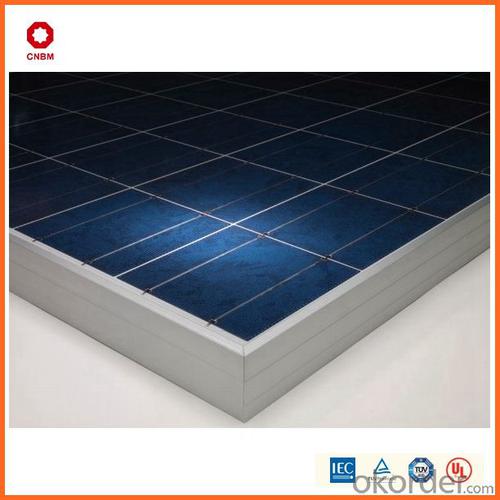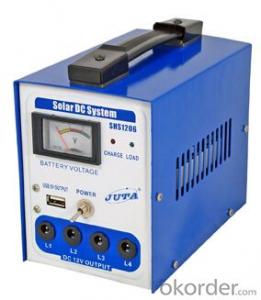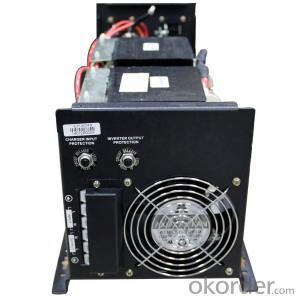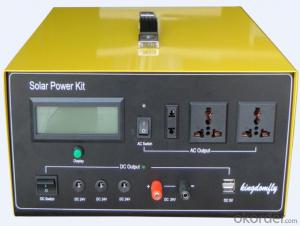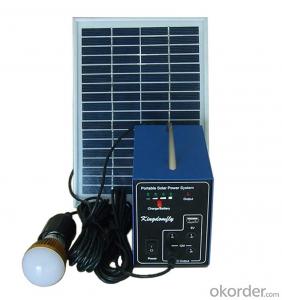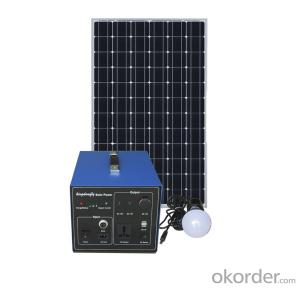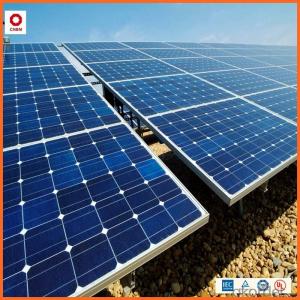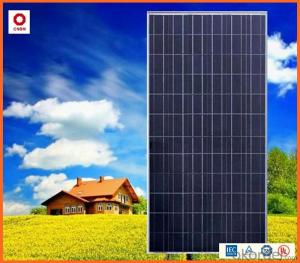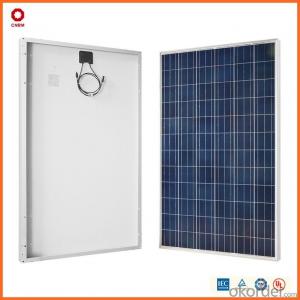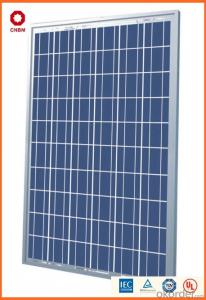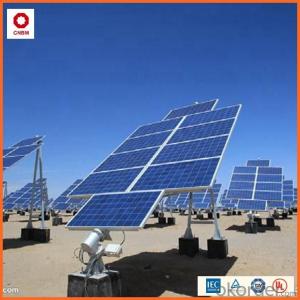Solar Energy Systems San Diego - Stock 305W Poly Solar Panel 0.46/W A Grade Good Solar Panel On Sale
- Loading Port:
- China main port
- Payment Terms:
- TT OR LC
- Min Order Qty:
- 1 watt
- Supply Capability:
- 10000000 watt/month
OKorder Service Pledge
OKorder Financial Service
You Might Also Like
Specification
Hot Sale !!! Quality and Safety of 245w-320w Poly Solar Panel
1. Rigorous quality control meets the highest international standards.
2. High-transmissivity low-iron tempered glass, strong aluminium frame.
3. Using UV-resistant silicon.
4. IS09001/14001/CE/TUV/UL
Warranties of 245w-320w Poly Solar Panel
1. 10 years limited product warranty
2. 15 years at 90% of the minimal rated power output
3. 25 years at 80% of the minimal rated power output
Technical date of 245w-320w Poly Solar Panel
Specification
Characteristics of Poly solar panels CNBM (245-320W) | |||||
Max Power Voltage Vmp(V) | 30.3 | 30.8 | 31.1 | 31.4 | 31.85 |
Max Power Current Imp(A) | 7.60 | 7.64 | 7.73 | 7.81 | 7.85 |
Open Circuit Voltage Voc(V) | 36.1 | 36.6 | 37 | 37.3 | 37.68 |
Short Circuit Current Isc(A) | 8.50 | 8.55 | 8.65 | 8.75 | 8.85 |
Max Power Pm(W) | 230W | 235W | 240W | 245W | 250W |
Temperature Coefficient of Cells Poly solar panels CNBM (245-320W) | |
NOCT | 45 ± 2 |
Temperature Coeffucients of Isc | 0.0492 |
Temperature Coeffucients of Voc ( | -0.3374 |
Temperature Coeffucients of Voc | -0.4677 |
Mechanical Data of Poly solar panels CNBM (245-320W) | |
Dimension | 1638 × 982 × 40 mm |
Weight | 19.5 kg |
No. of Cells and Connections | 60 (6 ×10) |
Tolerance | 0 ~ + 5 W |
Cell | Monocrystalline Cell 156 × 156 mm |
Packing | 624 Pcs/40ft(H) Container |
Limits of Poly solar panels CNBM (245-320W) | |
Operating Temperature | -4 0to +85 |
Storage Temperature | -40to +85 |
Max System Voltage | 1000VDC(IEC) / 600VDC(UL) |
Features of our products:
• High conversion efficiency mono/poly-crystalline amorphous silicon solar cells
• Modules incorporate high performance bypass diodes to minimize the power drop caused by shading
• High transmittance, low-iron tempered glass
• High performance EVA encapsulant to prevent destroying and water.
• AI frame: without screw, corner connection. 8 holes on the frame can be installed easily
• Good performance of preventing from atrocious weather such as wind and hails
• Certifications: CE IEC TUV VDE UL, Class I
• 10 years 90% power output warranty

- Q: How does the quality of solar panels vary across different manufacturers?
- The quality of solar panels can vary significantly across different manufacturers. Several factors contribute to this variation. Firstly, the materials used in the manufacturing process can greatly influence the quality of the panels. Some manufacturers may opt for cheaper materials that may degrade or have lower efficiency over time, while others may use high-quality materials that ensure durability and optimal performance. The type and quality of photovoltaic cells used in the panels can also vary, affecting their conversion efficiency and overall power output. Secondly, the manufacturing processes and technologies employed by different manufacturers can impact the quality of solar panels. Companies that invest in advanced production techniques and quality control measures are more likely to produce panels with superior workmanship and reliability. On the other hand, manufacturers with subpar manufacturing processes may produce panels that are more prone to defects, malfunctions, or premature degradation. Thirdly, the level of research and development undertaken by manufacturers plays a significant role in panel quality. Companies that invest in research and development are often at the forefront of technological advancements, resulting in panels with higher efficiency, better durability, and improved performance. Conversely, manufacturers that lack investment in R&D may offer panels with outdated technology or lower reliability. Additionally, the reputation and track record of a manufacturer can provide insights into the quality of their solar panels. Established manufacturers with a long history of producing reliable and high-performance panels are generally more trustworthy than new or unknown companies. Independent certifications and third-party testing can also help assess the quality of panels, as they provide an unbiased evaluation of their performance, durability, and adherence to industry standards. It is crucial for consumers to thoroughly research and compare different manufacturers before investing in solar panels. Factors such as materials, manufacturing processes, R&D investments, reputation, and certifications should all be taken into account to determine the quality and long-term reliability of the panels.
- Q: Can solar energy systems be used in powering amusement arcades or gaming centers?
- Indeed, amusement arcades or gaming centers can rely on solar energy systems to supply power. These systems transform sunlight into electricity, furnishing a pristine and renewable power source. By situating solar panels on the roofs of said establishments or in nearby regions with ample sunlight, the electricity produced can fuel the arcade machines, gaming consoles, lighting, air conditioning, and other electrical appliances employed within the premises. Moreover, in addition to diminishing electricity expenses, solar energy systems yield long-term financial benefits and present a sustainable remedy that corresponds with the burgeoning desire for eco-friendly operations.
- Q: Do solar energy systems require a lot of space?
- Solar energy systems do not necessarily require a lot of space. The space required for a solar energy system depends on various factors such as the energy needs of the building or facility, the efficiency of the solar panels, and the available sunlight. For residential solar energy systems, the space required can vary depending on the size of the roof and the energy consumption of the household. Many residential solar installations can be done on rooftops, utilizing the existing space without the need for additional land. In some cases, ground-mounted systems may be used if there is enough space available. On the other hand, utility-scale solar energy systems that generate power for large communities or commercial facilities may require larger areas of land. These systems typically use large arrays of solar panels and require a significant amount of space to maximize energy production. However, it is worth noting that with advancements in solar panel technology, the efficiency of solar panels has increased, allowing for more power to be generated from a smaller area. Additionally, solar panel installation techniques have also improved, allowing for more flexibility in system design and placement. In summary, while solar energy systems may require some space, the amount of space required depends on several factors and can be tailored to fit the specific needs and available resources of a particular installation.
- Q: What are the disadvantages of using solar energy systems?
- Solar energy systems offer numerous benefits, but it is important to consider the drawbacks as well. There are several disadvantages associated with using solar energy systems, including the following: 1. High initial costs: The installation and setup of solar panels and necessary equipment can be expensive. This can be a significant investment for homeowners or businesses, making it less viable for those with limited financial resources. 2. Dependence on sunlight: Solar energy systems rely on sunlight to generate electricity. As a result, energy production can be intermittent, as they do not generate electricity during cloudy days or at night. To overcome this limitation, energy storage systems or backup power sources are needed, which can increase costs. 3. Space requirements: Large-scale solar energy systems require a significant amount of space for installation. This can be a challenge in densely populated areas or places with limited land availability. Additionally, rooftop installation may not be possible for buildings with structural limitations or in shaded areas. 4. Environmental impact of manufacturing: While solar energy systems produce clean and renewable energy, the manufacturing process can have environmental consequences. The production of solar panels involves the use of potentially hazardous materials and requires a significant amount of energy. The disposal of these panels at the end of their lifespan also presents environmental challenges. 5. Performance variability: The efficiency of solar panels can vary depending on factors such as location, weather conditions, and maintenance. Dust, debris, or shading can reduce their efficiency, necessitating regular cleaning and maintenance. 6. Limited energy storage capacity: Storing excess energy generated by solar panels is vital for consistent power supply during periods of low sunlight. However, current energy storage technologies, such as batteries, have limited capacity and can be expensive, restricting the ability to store large amounts of energy for later use. 7. Geographic limitations: Not all regions receive the same amount of sunlight, which affects the efficiency and effectiveness of solar energy systems. Areas with low solar radiation or extreme weather conditions may not be suitable for efficient harnessing of solar energy. Despite these disadvantages, ongoing technological advancements and research aim to address these challenges and make solar energy systems more accessible, efficient, and cost-effective.
- Q: What is the role of batteries in solar energy systems?
- The role of batteries in solar energy systems is to store the excess energy generated by the solar panels during the day and provide a consistent power supply during times when sunlight is not available, such as at night or during cloudy weather. By storing this energy, batteries allow for a reliable and continuous power supply, making solar energy systems more efficient and practical.
- Q: Are there any maintenance costs associated with solar energy systems?
- Solar energy systems come with maintenance costs. Although solar panels require minimal maintenance compared to other energy systems, there are still expenses involved. These include regularly cleaning the panels for optimal efficiency, inspecting and repairing any damaged or malfunctioning components, and occasionally replacing worn-out parts. Moreover, monitoring and maintaining batteries or inverters that store and convert energy may be necessary. It is also advisable to have a professional conduct an annual inspection to ensure proper functioning. While these maintenance costs are generally low compared to the savings generated from solar energy, it is essential to consider them when analyzing the overall installation cost.
- Q: Can solar energy systems be used in areas with limited access to food?
- Yes, solar energy systems can be used in areas with limited access to food. Solar energy systems provide a sustainable and reliable source of electricity, which can power various applications, including food production and processing. Solar-powered irrigation systems can be used to water crops, while solar-powered refrigeration can help preserve food. Additionally, solar energy can be utilized to power hydroponic or vertical farming systems, enabling food production in limited spaces. Therefore, solar energy systems can play a crucial role in addressing food scarcity and promoting food security in areas with limited access to food.
- Q: What is the efficiency of solar energy systems?
- The efficiency of solar energy systems varies depending on various factors such as the type of system, location, and design. On average, solar photovoltaic (PV) panels have an efficiency range of 15% to 20%, while concentrated solar power (CSP) systems can reach efficiencies of up to 40%. However, advancements in technology continue to improve the efficiency of solar energy systems, making them increasingly competitive and viable as a renewable energy source.
- Q: Can solar energy systems be installed on camping sites?
- Yes, solar energy systems can be installed on camping sites. In fact, solar panels are commonly used to power camping equipment such as lights, portable chargers, and even small appliances. They are a sustainable and convenient solution for accessing electricity in remote locations without the need for traditional power sources.
- Q: What happens to excess solar energy produced?
- Excess solar energy produced can be stored in batteries for later use, fed back into the grid, or utilized to power other devices or systems such as heating or cooling systems.
Send your message to us
Solar Energy Systems San Diego - Stock 305W Poly Solar Panel 0.46/W A Grade Good Solar Panel On Sale
- Loading Port:
- China main port
- Payment Terms:
- TT OR LC
- Min Order Qty:
- 1 watt
- Supply Capability:
- 10000000 watt/month
OKorder Service Pledge
OKorder Financial Service
Similar products
Hot products
Hot Searches
Related keywords
